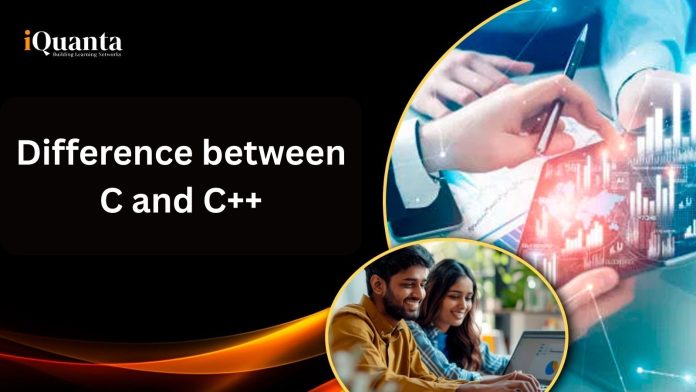Programming is the backbone of the computing world, and the two most popular languages are C and C++ to which every individual has started their coding journey. Whether you are a beginner stepping into the coding world or an experienced developer, understanding of these both languages are essential.
C and C++ cover various features, advantages and object oriented principles which are required to understand the coding syntax and are beginner friendly also.
In this blog, we will explore more about what C and C++ are, their differences, advantages, and disadvantages, and help you decide which to use. So Let’s deep dive to understand the journey of C and C++ languages.

What is C Programming?
C is a procedural programming language which is developed Dennis Ritchie at AT & T Bell Labs. It was designed to develop system softwares and is known for its simplicity, speed, and close relationship with hardware systems like RAM, CPU, and other embedded devices.
C is often called the mother of all programming languages because many modern languages like C++, Java, and Python have follow basic syntax of C programming languages itself.
There are some basic features of C programming languages :
- Structured and procedural
- Low level memory access
- Fast execution
- Portable and efficient
What is C++?
C++ is an object-oriented programming language developed by Bjarne Stroustrup in the early 1980s as an extension of C programming language because most of the syntax of C has been supported by C++ also. It supports both procedural and object-oriented programming, making it a hybrid language.
C++ introduced concepts like classes, inheritance, polymorphism, and encapsulation, enabling the creation of complex and scalable software systems. This is one of the preferred programming language to start data structures and competitive programming with.
There are some key features of C++ Programming language includes :
- Supports object-oriented programming
- Strong type checking
- Rich standard library (STL)

Difference between C and C++
| Aspect | C | C++ |
| Developed By | Dennis Ritchie | Bjarne Stroustrup |
| Year of Development | 1972 | 1983 |
| Programming Paradigm | Procedural | Multi-paradigm (Procedural + Object-Oriented) |
| Main Use Case | System programming, embedded systems | Application development, game engines, system software |
| Approach to Programming | Top-down | Bottom-up |
| Object-Oriented Support | Not supported | Fully supported |
| Classes and Objects | Not available | Supported |
| Inheritance | Not available | Supported |
| Encapsulation | Not supported | Supported |
| Polymorphism | Not supported | Supported |
| Function Overloading | Not supported | Supported |
| Operator Overloading | Not supported | Supported |
| Exception Handling | Not available | Supported (try, catch, throw) |
| Namespace Feature | Not available | Available (namespace keyword) |
| Memory Management | Manual (malloc(), calloc(), free()) | Manual and advanced (new, delete, constructors/destructors) |
| Templates / Generics | Not supported | Supported (template <typename T>) |
| Standard Library | Minimal (stdio.h, stdlib.h, etc.) | Extensive (STL – vectors, maps, queues, etc.) |
| Input/Output Functions | scanf(), printf() | cin, cout, along with C functions |
| Header Files | .h extensions (e.g., stdio.h) | .h and standard headers without .h (e.g., iostream) |
| Code Modularity | Limited modularity via functions | Highly modular using classes and OOP concepts |
| Security and Data Hiding | Minimal (no access specifiers) | Supported via private, public, and protected access specifiers |
| Speed of Execution | Generally faster due to simplicity | Slightly slower (object handling adds overhead) |
| Syntax Complexity | Simpler syntax | More complex due to added features |
| Extensibility | Less extensible | Highly extensible and scalable |
| Compiler Support | GCC, Clang, Turbo C | GCC, Clang++, MSVC, Turbo C++ |
| Garbage Collection | Not available | Not available (manual memory handling) |
| Compatibility with C | Not applicable | Can run most C code with few modifications |
| Multiple Inheritance | Not supported | Supported |
| Constructor/Destructor Support | Not available | Available |
| Inline Functions | Not supported | Supported (inline keyword) |
| Virtual Functions | Not supported | Supported (runtime polymorphism) |
| Friend Functions | Not available | Supported |
| Abstraction Support | Limited | Strong abstraction through classes and interfaces |
| Multithreading Support | Limited | Better support via libraries |
| Portability | Highly portable | Portable, but OOP features may vary across compilers |
| File Extension | .c | .cpp |
| Learning Curve | Easy to learn for beginners | Moderate due to OOP concepts |
Advantages of C and C++
While working with C and C++ these both programming languages offers multiple advantages or benefits we can say
Advantages of C
- C runs very fast which makes it a great choice for building programs that need high speed and performance.
- You can write a C program once and run it on different computers with very few changes.
- It gives you control over how memory is used which helps in building powerful and efficient programs.
- If you learn C first it becomes easier to understand and learn other programming languages later.
- C is used in many important areas like operating systems, computer games, machines, and devices.
Advantages of C++
- C++ supports object-oriented programming which helps in writing clean and organized code.
- It lets you reuse code through features like classes and inheritance which saves time and effort.
- C++ is faster than many other high-level languages which makes it good for games and real-time apps.
- You can use both C and C++ features in one program which gives more flexibility to developers.
- It has a strong standard library that provides many built-in tools to make programming easier.
Disadvantages of C as well as C++
Over various advantages we have seen above there are some disadvantages that we are facing in C as well as in C++.
Disadvantages of C
- C does not support object-oriented programming which makes it hard to manage big projects.
- There is no built-in way to handle errors so you must manage everything manually.
- It does not support data hiding so anyone can access any part of the code.
- C has no support for modern features like classes or templates which limits flexibility.
- Memory management in C is manual which can lead to serious bugs if not done properly.
Disadvantages of C++
- C++ code can get complex because of too many features like inheritance and templates.
- It takes more time to compile and run compared to simpler languages like C.
- Too much use of pointers and memory management can make the program unsafe.
- C++ is not as beginner-friendly as other languages due to its advanced concepts.
- It does not have automatic garbage collection so memory must be handled by the programmer.

Conclusion
C as well as C++ both are very powerful programming languages that have been used for many years. C is great for beginners who want to understand how computers work at a basic level. It is fast and works well for system programming. On the other hand C++ is an improved version of C that adds many features like object oriented programming which helps in building large and complex software easily.
If you are just starting C is a good place to learn the basics. Later you can move to C++ to build more advanced programs. Both languages have their own strengths and are still used in many companies and projects today. Choosing between them depends on what kind of software you want to make and how you like to write your code.
Know more about C as well as C++
What is the main difference between C and C++?
C is a procedural programming language while C++ supports both procedural and object-oriented programming.
Can I run C code in a C++ program?
Yes most of the C code can run in a C++ program with little or no changes.
Which language is easier to learn for beginners C or C++?
C is generally easier for beginners because it has fewer concepts to learn.
Is C++ slower than C?
C++ can be a little slower due to extra features but it is still very fast for most programs.
Where are C and C++ mostly used today?
They are used in system software, games, embedded devices, and many performance-critical applications.


![Top 10 Applications of Linked List Data Structure [2025]](https://www.iquanta.in/blog/wp-content/uploads/2025/02/WhatsApp-Image-2025-02-01-at-2.48.42-PM-218x150.jpeg)

